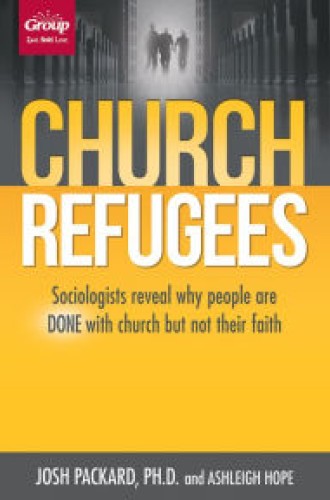The faith of the Dones
The Dones aren’t leaving church because they’re burned out. They’ve hit so much bureaucracy that they seek more efficient venues.
We had a morbid joke when I was on the staff of a large church: after someone completed a term as moderator of the church council, we would ask, How long until she leaves? The same applied to past chairs of senior pastor search committees—they had all moved on.
Amid all of the discussion about the denouement of mainline Protestantism, there has been no lack of books, articles, and blog posts about the nones and the SBNRs (spiritual but not religious). Sociologists Josh Packard and Ashleigh Hope focus on a smaller subset of those who have left organized Christianity—and who took a lot with them when they did: the Dones, whom the authors also call church refugees and the dechurched.
Read our latest issue or browse back issues.
This book was written by evangelicals for evangelicals, but it resonated with my own experiences in parish ministry and as a seminary educator. Mainliners will simply have to do some on-the-go translation as they read.
The Dones haven’t quietly moved from the back pew and slipped out the door. They were not negligibly connected parishioners before their departure. Instead, the Dones were central to the congregation’s life—giving money, serving in leadership, committing time and talents. These people were deacons, served on committees and boards, led mission trips, and worked in the kitchen during the confirmation banquet. In the old pastoral axiom that says, “20 percent of the people do 80 percent of the work,” these people were part of the 20 percent.
When Dones leave the church, Packard and Hope note, “they take with them all of the institutional knowledge and training, all of their energy and talents, and all of their social connections that extend beyond the walls of the church.” These congregants are rich in social capital, and their departure causes systemic harm to the organization.
It’s one thing to survey the nones. They’re ambivalent about religion; they’ve never really committed, and they’re not likely to change. It’s another thing to ask the Dones why, after years of loyal service, they walked away. Packard and Hope’s study is based on qualitative research: over 100 interviews, transcribed and analyzed. What they found is both unsurprising and enlightening.
One reason the Dones have left is that they felt judged. The authors make clear that both explicit and implicit forms of judgment drive people away. The implicit version may be more likely to afflict traditional mainline congregations, which are often beset by entrenched modes of communal life that lead some to feel in and others out.
This leads to the second reason the Dones are done with church: bureaucracy. One respondent said, “It got to the point that just to have a simple meal in the church with some friends or a Bible study, we had to go through three committees. It just wasn’t worth it anymore.” Packard and Hope make it clear that the Dones are not leaving because they’re burned out. Instead, they have hit so many roadblocks that they’re seeking other organizations where their talents are more appreciated and more efficiently used.
Packard and Hope suggest that churches be less judgmental, less moralistic, and more open to dialogue and disagreement. Another pill they prescribe will be difficult to swallow: “Undermine bureaucracy.” Bureaucracy, they write, militates against both innovation and relationality, two characteristics that these high-performing Dones missed in the church. The conclusion: if you want the Dones back, or don’t want to lose others like them, then dismantle the systems that frustrate them.







